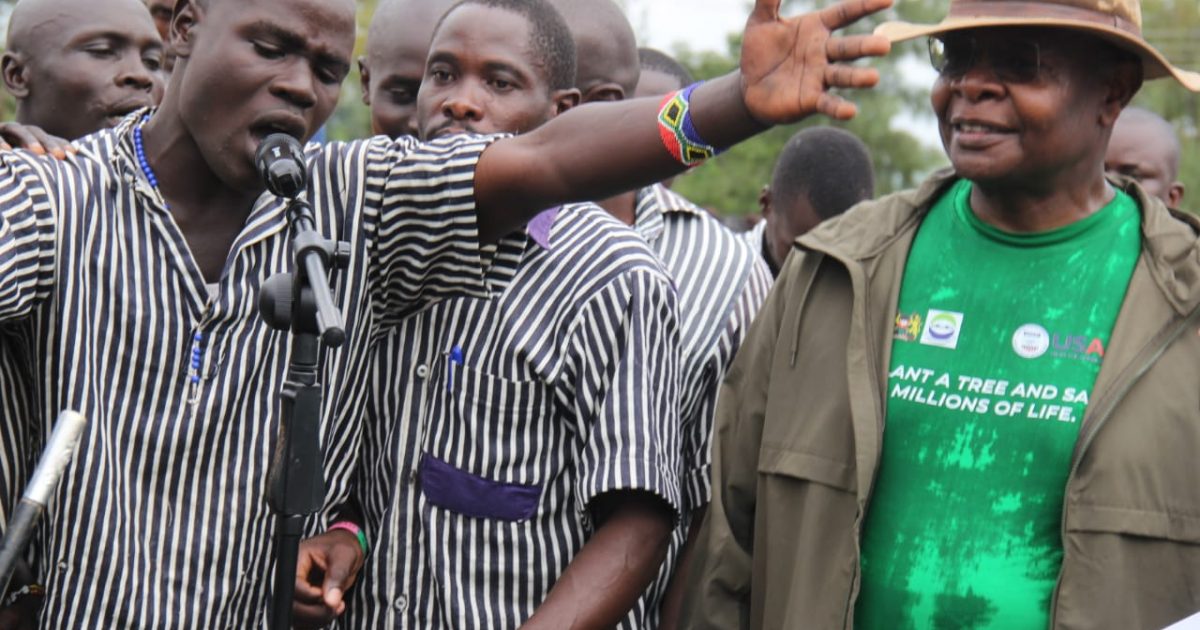Meet Musundi Tindi, an inmate at Korinda GK prison in Busia County whose rap music thrills audiences in Busia whenever given a platform to perform.
Despite being convicted of murder and sentenced to serve 25 years in the institution, Tindi looks very jovial as he interacts with the writer.
‘I was brought here in 2016 but was convicted of murder in 2019,” he says, adding that he has served 7 years at the facility.
Tindi has a passion for singing, which has been part of him since his childhood in Butula Sub County.
‘I began singing while in school, and on joining this institution, I realised that there were young men who could sing but they lacked a platform,’ he says.

He further states that a number of youth engage in criminal activities because they have not discovered their talents.
‘I normally emphasise conscious music that can empower members of the community to change their character,” he says, adding that messaging is key.
Tindi adds that having been trained as a paralegal within the institution helps him come up with such messages.
“The officers in charge of this institution realised that our talent was important after we managed to entertain certain visitors who visited this facility sometimes,” he says, adding that one of the officers donated a woofer to support them.
He adds that they have managed to form a group dubbed Team Young Masters (TYM) that engages in music, spoken word or poetry, drama, comedy, and acrobats, among others.
“I have already trained more than 100 inmates, some of whom have completed their sentences,’ he says.
Tindi, who is yet to serve his murder sentence until 2036, says that he is aspiring to identify, mould, and record talents among the youth as a way of preventing crimes.
“I want to tell the youth to be disciplined, respect the law, and trust themselves,’ he says, adding that peer pressure is a major challenge to the young generation.
He further says that youth should be keen on choosing their friends, lamenting that had he not been associated with one of the accomplices in the murder case, he could not be behind bars.
Tindi lauds the institution for granting the inmates a chance to nurture their talents and requests that they be supported with the necessary equipment.
‘I would also ask them to ensure that we have a studio within the institution so that we record our production, and upon clearing our sentences, each individual can be given a copy to sell,’ he opines.
Rajab Onyango, a remandee at the institution, says that he developed an interest way back in primary school through his secondary education.
Onyango, who adds that he later joined Busoga Teachers Training College in Uganda, says that he scans his environment in order to come up with a news item.
‘This is my ninth month here, and the institution’s leadership has greatly assisted in polishing my work,’ he says, adding that the mentors also help in editing his work.
He adds that prison is an area of rehabilitation where a section of inmates have been trained in carpentry and music, among others.
Onyango cites Caro Robi, Ngulamu Mwabiro, and Martin Nyongesa King’asia as some of his role models in the journalism industry.
‘If given a mentor, I would gladly join the journalism profession,’ he says, adding that the profession touches the audience directly.
Michael Mutuku, a Human Rights Officer in charge of mentoring the talents of the inmates at the facility, says that he realised that some of the inmates had talents in various fields.
“Fortunately, the institution decided to come up with a window that recognised innovation, recreation, and skills for both remandees and inmates,’ he says, adding that the leadership mandated him to be in charge.
Mutuku adds that he initially majored in music, where the inmates wrote songs, and he made sure that they were edited before being displayed to the audience.
‘Here we receive visitors from all walks of life, and we do messaging depending on the intended audience,” he says.
He adds that he currently has 21 inmates with music potential from both staff and inmates.
“Once I identify any inmate with a talent, I ensure that he joins this group,” he says, adding that a third of their music content is about life in prison while the remaining contains some teachings to the community.
Mutuku further says that members of the group are issued flash discs containing their music upon completion of their jail term so that it can serve as their capital.
“Armed with the flash disc, the member can look for an audience either from churches, open-air events, or scout for jobs from various interested companies,’ he says, adding that they can also post such on social media platforms so that they can earn some income.
He adds that two more officers have also joined the team, with one of the officers carrying out production work for the group.
‘Though music production is not part of our rehabilitation programme, if embraced and staff interested in music is posted here, it can help us have a studio so that the programme can be sustainable,’ he says, adding that currently they do not have recording equipment.
The officer further says that some funding should be channelled to the sector to ensure that flash discs are bought for inmates who have completed their sentences.
He adds that all 21 inmates are able to create and write their own songs, emphasising that their music productions are original in nature.
“Marketing our music is a big challenge because the group is within the prison,’ he says, adding that a framework should be developed so that any future proceeds can be channelled directly to the programme.
Mutuku says that the initiative has helped increase discipline because of the laws that they have placed.
“Members of this group are also deployed in other rehabilitation programmes, but they try to do them fast so that they can come and sing,’ he says, adding that it has also led to a change of attitude.
At the same time, he says that music helps the inmates raise their self-esteem, adding that this finally helps them to argue their cases well in court.
Mutuku blames a lack of platforms, opportunities, and high poverty levels for the high number of youth being held at the institution.
By Salome Alwanda




